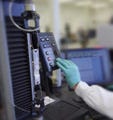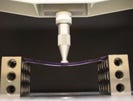September 20, 2011
As traditional medical devices evolve into drug-delivery devices, medical device OEMs must enlist the support of contract testing service providers that can perform regulatory testing, maintain appropriate quality systems, and test and characterize device materials and drugs. Explaining the issues involved in these particular testing applications is Eric Hill, business marketing and sales manager of Impact Analytical (Midland, MI). MPMN: What testing services should be foremost in medical device OEMs' minds?
MPMN: What testing services should be foremost in medical device OEMs' minds?
Hill: Regulatory testing is the most important testing area in the medical device industry. With increasing device complexity and the growing importance of drug-delivery devices, it is critical that proper testing be performed to understand and document device performance. The next most important service is development support. Accurate and reliable testing during the development phase can identify issues that require improvement when they can still be corrected easily and cost-effectively. Testing during the development stage can help eliminate the need to perform further development work later.
MPMN: What tools, analytical techniques, and expertise should medical device OEMs demand of testing-service providers?
Hill: Since medical device testing projects are often followed closely by FDA audits, OEMs should demand that prospective testing suppliers have robust, mature quality systems in place that can endure regulatory audits. Thus, OEMs should partner with testing suppliers that have a quality program in place and that have experience in dealing with FDA to ensure that audits proceed smoothly. Quality systems should go hand in hand with the supplier's ability to perform a range of analytical techniques, such as raw-materials characterization, quality control and failure analysis, and leachables and extractables studies.
MPMN: When medical device manufacturers seek a testing partner for drug-delivery devices, what should they be aware of?
Hill: One of the most salient trends in the field of medical device design and development is drug delivery. Hence, medical device OEMs should seek to partner with testing laboratories that can characterize catheters, balloons, guidewires, and drug-eluting stents. Furthermore, the supplier must be able to understand the drugs that devices deliver and the interactions between the device and drug. OEMs should ask: Do prospective testing partners have the experience and expertise to characterize such complex systems? Are they willing to partner during development to create adequate methods for testing new applications?
A material's properties change when a drug is embedded in it. And it may change further when it is introduced into the body. Thus, it's critical for OEMs to work with testing suppliers that can determine the compatibility between materials and drugs and how they interact inside the body. To that end, OEMs should ensure that potential testing partners can perform chemical tests in an environment that simulates body conditions.
 Regulatory device testing
Regulatory device testing
EAG Life Sciences offers regulatory medical device testing services to support product development, including chemical analysis, physical testing, and surface analysis. The company analyzes a variety of materials and possesses knowledge of FDA regulations and ISO 10933 standards. In the area of chemical analysis, the company's offerings include CGMP/GLP analytical testing, stability studies, materials characterization and selection, and programs to investigate extractables and leachables. Physical testing capabilities comprise exposure and stress testing, microscopy, and imaging. Corrosion and oxidation studies, defect analysis, and adhesion testing are among the surface-analysis services available.
EAG Life Sciences
SUNNYVALE, CA
www.eaglabs.com Force analysis services
Force analysis services
Providing custom medical device analysis services and a variety of analyses and tests, Gilero LLC is equipped with force analysis instruments that ensure medical device performance. The equipment can measure compressive and tensile forces and perform functional tests involving cyclic loading. The company has conducted evaluations of such products as needle-free valves, vial-access devices, urinary catheters, topical-delivery devices, and hypodermic needles. Its ability to read force results in real time and to alter test settings enable it to perform custom and standardized testing.
Gilero LLC
RESEARCH TRIANGLE PARK, NC
www.gilero.com Device performance testing
Device performance testing
Machine Solutions Inc. offers device performance testing services involving stents, guidewires, guide catheters, delivery systems, PTCA catheters, PTA catheters, embolic-protection devices, and endoscopic tools. Designed to quantitatively analyze device performance features, the tests can support regulatory submissions. Preclinical trial tests, competitive-product tests, and tests of product designs are also offered. Nearly two dozen tests are performed on catheters and guidewires, and a dozen challenges are presented to stents and filters, including balloon burst and fatigue resistance, bond strength, insertion force, and torque strength.
Machine Solutions Inc.
FLAGSTAFF, AZ
www.machinesolutions.org Material and microbiological testing
Material and microbiological testing
A multidisciplinary network of laboratories, Sherry Laboratories offers metallurgical, nonmetallic, and microbiological testing and engineering services for medical device manufacturers. Using A2LA-approved materials laboratories that meet ISO 17025 standards, the company performs such evaluative investigations as failure analysis, life cycle testing, adhesives studies, corrosion testing, fastener testing, metallography, physical testing, plastics testing, rubber testing, stress rupture analysis, tensile testing, hardness testing, chemical analysis, scanning electron microscopy, and mechanical testing.
Sherry Laboratories
DALEVILLE, IN
www.sherrylabs.com Full-service contract testing
Full-service contract testing
A full-service contract testing laboratory can characterize raw materials, perform extensive leachables and extractables studies, and conduct quality control testing and failure analysis. The portfolio of services performed by Impact Analytical also includes the analysis of impurities, measurement of material properties, detection of residual solvents and detergents, and identification of unknown components. The company has worked with a variety of raw-material samples, plastics, chemicals, contaminants, and gases. Its laboratory typically tests such products as catheters, guidewires, balloons, oxygen- and aerosol-therapy products, airway-management devices, and disposable medical devices. Certified to ISO 9001:2008 standards, the service provider satisfies GLP and CGMP requirements in conducting routine testing.
Impact Analytical
MIDLAND, MI
www.impactanalytical.com
You May Also Like


